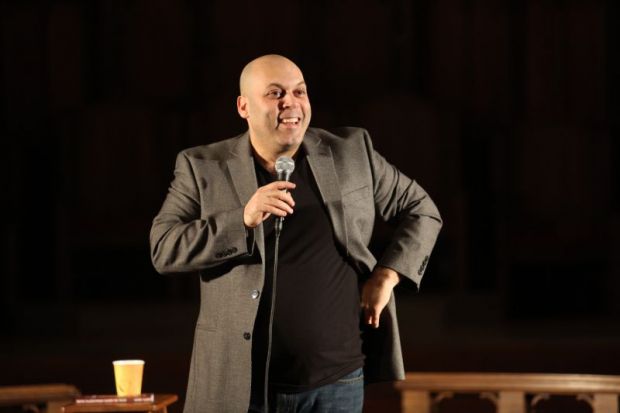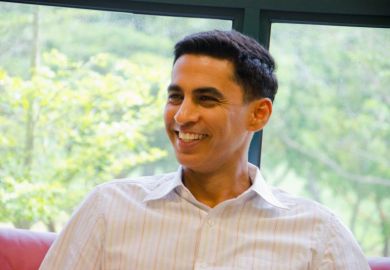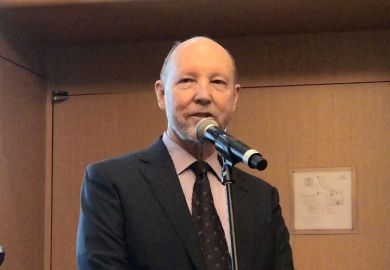Amer Zahr is adjunct professor of law at the University of Detroit Mercy. There, he teaches a unique course on the history of Arab Americans and US law, with lessons on topics such as why Arab Americans are legally classified as white. His chief occupation, however, is that of stand-up comedian. He travels the US and the world, finding humour in many of the same issues that he teaches about and lives through.
What’s your origin story?
My parents were Palestinian. They were both refugees educated in the US. They later returned to Jordan, where I was born in 1977. In 1980, we moved to the US. I grew up outside Philadelphia and attended the University of Michigan, where I received my bachelor’s degree in history, my master’s degree in Middle East studies and my law degree.
How did you find your way to this point?
I definitely didn’t have any sort of traditional career in mind. I was always an activist, always someone who melded academia with advocacy. In 2003, while in law school, a student was bringing an Arab comedian to campus and they told us to put out the word that if anyone wants to fill up some time on stage before him, they could. So I put my name out there and I did five or 10 minutes on stage. My opening joke was about my dad, everybody laughed and I kind of got hooked on the idea of being on stage. That was 15 years ago, and they’re still paying me to tell jokes.
That’s now your primary job?
Correct. My comedy act morphed into some talks and performances at colleges and universities. At Detroit Mercy, I hooked up with some former students from when I was a graduate student at Michigan. They liked some of the guest lectures that I gave, and I decided to submit a syllabus. They accepted it, so the class that I teach is called Arab Americans and the Law. It’s the only one of its kind in the nation, covering race and how it came to be that Arab Americans were classified as white in this country.
What’s the short answer to that question?
From the inception of citizenship and naturalisation law in the US, from 1790 to 1952, the legal prerequisite for citizenship was whiteness – you had to be white. That was in the law. Many immigrant groups that came to the US tried to prove legal whiteness as a means of getting in, or staying in. Many failed, many succeeded. Arabs were one of the groups that wavered on this notion. Finally, in the 1910s, it was sort of settled that they were white. Then that ruling was overturned in the 1940s when a Muslim Arab tried to take advantage of it. And then it was overturned again, to make us “white” again, in the 1940s. So it’s been a whole saga, and it presents a lot of legal problems. Since Arabs are not technically considered a minority, we have lots of hurdles to overcome when we want to sue under anti-discrimination statutes, or for employment discrimination, for example.
What is Donald Trump's position on the classification of Arab Americans as white?
We’ve been fighting for a long time to get a law passed. Obama, before he left office, expressed support for a new box on the Census form. And Hillary Clinton had said that she might do it. Trump, when he got elected, immediately nixed the idea. Not because he thinks we’re white – he obviously does not think we’re white. But because, obviously, that would open up a whole avenue of civil rights claims, and bring us more into the fabric of the US, which he definitely does not want. He more believes that we shouldn’t have civil rights protections than he doesn’t believe that we are white.
Where do you travel for your shows?
All around the world. I go to the Middle East at least two or three times a year. I perform in Europe, I perform at a lot of campuses and community events around the US. Tonight I’m on my way to Arkansas to perform at a fundraiser for an Islamic group. I perform in Palestine at least two or three times a year. Also in Jerusalem. I do comedy workshops in refugee camps and for youth organisations, to show young people how they can use comedy and art to express themselves. I have this line in my book [Being a Palestinian Makes Me Smile] that you can see somebody laugh so much they start crying. But you can also see somebody crying so much they start laughing. So the emotions aren’t that different – somehow they connect to each other.
What was that first joke you told about your dad?
I wasn’t political as much in the beginning. My dad didn’t grow up with voicemail or answering machines or anything like that, and he would sometimes yell into my voicemail because he thought it was like an answering machine and I could hear him on the other end. He still does it, and he’ll leave his full name, and the house number, very professionally, just to make sure that I get the information. I realised that comedy is an amazing way to get a point across, because laughter is disarming. And if you make somebody laugh, they have a tendency to listen to you, much more than if you’re giving them an academic talk. No matter how smart you are, if you make someone laugh, they listen.
Is Trump a gift to comedians?
I tell jokes about Trump. But I don’t feel that good about it, because I don’t think that he gets the joke. And when the subject of your joke doesn’t get it, sometimes it’s bullying. Also it’s so easy – I don’t feel like I'm really engaging in any sort of artistic endeavour to tell a joke about Trump. Nevertheless I do it.
Paul Basken
Appointments
Félix V. Matos Rodríguez is to become the first Latino chancellor of City University of New York. The president of Queens College’s, one of the 25 institutions in the CUNY network, will start his new role in May. Professor Matos Rodríguez, an authority on the history of women in the Caribbean, is one of the few US educators to have led both a four-year college and a community college, having previously been president of Hostos Community College in the Bronx from 2009 to 2014. The Puerto Rico-born graduate of Yale and Columbia universities said that he was “immensely proud to have risen through the university’s ranks and am deeply honored to now have the opportunity to lead an institution I love and treasure.” He described the CUNY system as the “paradigm of a people’s university”.
Javaune Adams-Gaston has been named the next president of Norfolk State University in Virginia. The current senior vice-president for student life at Ohio State University, she will assume her new role at the historically black institution this summer. In her current role, Dr Adams-Gaston oversaw the university’s approach to the comprehensive student experience, co-curricular strategy and involvement opportunities, including the nationally recognised Second-year Transformational Experience Program, and transformed the university’s career support programmes.
Mark Searcey has been appointed pro vice-chancellor for science at the University of East Anglia. Professor Searcey, who is currently chair of medicinal chemistry and head of UEA’s schools of pharmacy and chemistry, will take up the new role in April.
Freddy Boey has become deputy president (innovation and enterprise) at the National University of Singapore. He steps up from his previous role at NUS as senior vice-president (graduate education and research translation) and will also lead NUS Enterprise, the university’s body for encouraging student start-ups and industry collaboration.
Register to continue
Why register?
- Registration is free and only takes a moment
- Once registered, you can read 3 articles a month
- Sign up for our newsletter
Subscribe
Or subscribe for unlimited access to:
- Unlimited access to news, views, insights & reviews
- Digital editions
- Digital access to THE’s university and college rankings analysis
Already registered or a current subscriber?





